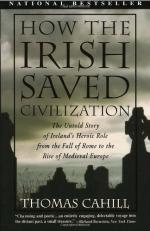|
This section contains 668 words (approx. 2 pages at 400 words per page) |

|
Chapter 1 Summary and Analysis
From the Alps flow northeastward the Rhine and eastward the Danube. These separate barbarians from the mighty Roman Empire, a polity encircling the vast Mediterranean Sea. An old "Prophecy of the Twelve Eagles," winked at during drinking parties, warns that Rome has only twelve centuries of life, and all but seventy years are past when, on Dec. 31, 406, Roman legions and German hordes face one another across the frozen Rhine. In every aspect of deportment, grooming, dress, weaponry-even culinary style-the two sides are polar opposites.
A dozen years after this encounter, the dying old St. Augustine, Bishop of Hippo in North Africa, explains in The City of God, how "vice-encumbered paganism", rather than the Roman gods' wrath at defections to Christianity, is to blame for barbarians hounding his city. Afterwards, Petrarch blames the empire's "inner faults" for its "fall", Machiavelli cynically blames...
(read more from the Chapter 1 Summary)
|
This section contains 668 words (approx. 2 pages at 400 words per page) |

|




